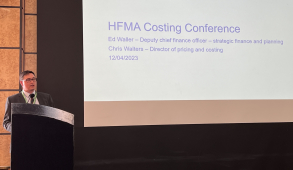Automation offers prospect of ‘Google translate’ for patient-level costs
Chris Walters (pictured), NHS England’s director of pricing and costing, told delegates at the event in London that the national body had listened to concerns about the national cost collection (NCC) process. In particular, he acknowledged that the national submission was too time-consuming and there was too big a delay before data was available to be used locally and nationally.
He said that an information gathering exercise, which was run after a streamlining project was first announced in November 2020, had identified four ‘consistent and predictable’ differences between national and local patient level costs. These included the services that were included or excluded from the various collections and the approach to unbundling. There were also differences in the degree of cost pooling – for example whether staff costs per patient were collected at the whole ward level or disaggregated by staff group. Finally, there were differences in how patient-level costs were linked to currencies.
‘The consistency and predictability of those differences open up the tantalizing possibility of developing and testing an algorithm for automatically mapping local to national patient-level costs using software – a Google translate for patient-level costs, as it were,’ he said. Testing of a mapping algorithm will begin before the end of the year.
Following this testing, there could be a rapid move to roll the system out. ‘Our goal is to run a shadow process alongside next year’s national cost collection and to fully automate the collection from 2025,’ he said. Mr Walters, who is leaving NHS England for a role outside the healthcare sector at the end of April, added that this would streamline the work needed locally to submit cost data. But it would also have benefits for the national team, opening up the prospect of more frequent ‘collections’ if this was called for by the different users of the national data.
The announcement follows a pilot run last July with a London trust to demonstrate that an automated extraction was possible using the NHS Foundry information platform. ‘This involved one extraction of local patient-level costs not the 96 submissions typical of the national cost collection and the process took two weeks – a fraction of the three to four months that is typical to submit the national cost collection,’ he said.
However, participants in the pilot qualified this. While the pilot was successful, it only explored the ability to automate the actual extraction of data. And while it did simplify the submission process, it did not reduce the amount of time taken to actually produce the data for the national cost collection. It is the overall production of data that practitioners suggest takes three to four months.
The next phase of the pilot will test the automatic extraction across an entire integrated care system later this year.
Ed Waller (pictured), deputy chief financial officer at NHS England said the NHS was in an ‘extremely difficult period’ – with its most challenging activity targets ever, a major backlog and a requirement to reduce waiting times, all against a background of a big financial challenge. He said the current settlement assumed the service would find about £12bn of efficiency over three years, with some areas facing bigger challenges than others. ‘This makes the cost of the things we do more important than ever,’ he said. He added that the consolidation of organisations at the centre – with NHS Digital being brought into NHS England – provided an opportunity to rethink the way that costing was undertaken.
Mr Walters also pointed at the national planning guidance priorities of recovering core services and improving productivity, reducing unwarranted variation and continuing to transform the NHS. ‘It is self-evident how important patient level costs are to those priorities,’ he said.
Related content
The Institute’s annual costing conference provides the NHS with the latest developments and guidance in NHS costing.
The value masterclass shares examples of organisations and systems that have pursued a value-driven approach and the results they have achieved.